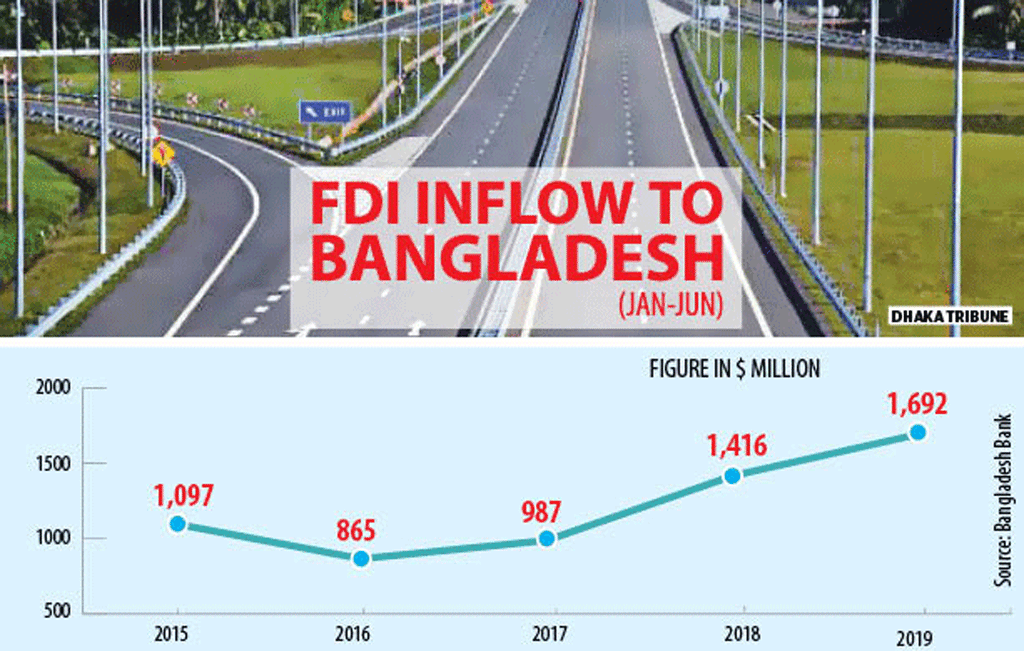Published in Dhaka Tribune on Saturday 19 October 2019
FDI grows by 20% in six months
Government reform initiatives cited as reasons

Foreign direct investment (FDI) in the country rose by 19.47% to $1.7 billion in the first half of 2019, which businesspeople and experts have attributed to government initiatives to improve ease of doing business.
According to Bangladesh Bank (BB) data, during January-June period of the current year, net inflow of overseas investment stood at $1.70 billion, up by 19.47%, which was $1.41 billion in the same period last year.
Of the total investment, equity capital was $409 million, intra-company loan $611.35 million and reinvestment $671 million.
In 2018, Bangladesh received a record $3.61 billion in FDIs, up by 67.94% of what it was in 2017.
Why FDI rises
Talking to Dhaka Tribune, business people and economists cited government initiatives to attract investment and improve ease of doing business and regulatory reforms as reasons for the rise in foreign investments.
“As we all know, the World Bank has named Bangladesh among the top-20 improvers in doing business in 2020. This is because of as the government’s various initiatives, such as policy reforms, removing infrastructural deficiencies and creating a positive business environment to encourage more investment by creating a business-friendly environment,” Bangladesh Investment Development Authority (BIDA) former executive chairman Kazi M Aminul Islam said.
Moreover, BIDA played a significant role by providing services within the shortest possible time through its one stop service (OSS), added Islam.
As a result, he stated, the foreign investors found it a suitable investment place and make investments here.
This upward trend would continue in the years to come as there were lots of initiatives in progress, while the mega projects would made doing business even easier here, he predicted.
WB has named Bangladesh among the 20 economies that saw progress in at least three out of ten areas of ease of doing business.
As per the report, Bangladesh has made it easier for entrepreneurs to start a business, obtain a power connection and access credit.
“Amid stagnancy in private sector investment, an uptrend in foreign investment is a positive sign for the country. It is because of government’s recent reforms, which brought positive changes in doing business,” Centre for Policy Dialogue (CPD) Research Director Khondaker Golam Moazzem told Dhaka Tribune.
But, added Moazzem, the matter to note was that these investment was focusing more on service sector rather than manufacturing industry.
“Since infrastructural development is going on, it is assumed that investments in manufacturing sector will increase, but it is yet to become visible,” the economist noted.
“Compared to the previous state of business environment, the present one is better as the government steps have minimized the time for getting business registration, electricity connection and other utility services,” said Abdus Salam Murshedy, managing director of Envoy Textile.
This boosted investor’s confidence, which helped Bangladesh receive more investment, added Salam.
Where improvements have happened
With the reforms, time for approving a new business has now come down to 11 days from 19 days, while the cost in this regard has also been decreased.
The fees for naming a company, certification and others have been slashed. As a result, costs in the process of getting approval for doing business have come down to 8.6% from 21%.
Approval for building a factory would formerly take 281 days, which now takes 76 days. Steps in the process of approval have been cut down to six from 16. This has decreased the cost of building a warehouse to 0.2% from 1.8% of the total cost.
Hassel in getting power connection has been reduced. Formerly, it would take 148 days, which now takes 107 days.
Land registration has been made easy. The mutation time has been cut down to 56 days, which was previously 106 days.
Bida claims that for export, time spent for processing official documents has been reduced to 36 hours from 168 hours while, for import, it has been cut down to 72 hours from 216 hours. The costs have also been reduced.
Previously, it would cost $408, which has now come down to $200 for export. For import, it would previously cost $900, which has been reduced to $200.
How to reap the most out of the reforms
“As per the seventh five-year plan of the government, FDI is supposed to be 3% of GDP and it should be about $9 billion. But we are far behind that,” former Dhaka Chamber of Commerce and Industry (DCCI) president Abul Kasem Khan told Dhaka Tribune.
“There are lots of reform initiatives and they are all on the right direction. But for lack of proper and slower implantation, Bangladesh still lags behind in ease of doing business,” Khan mentioned.
“There is political commitment but it gets stuck when it comes to execution, which may be for lack of cooperation among the ministries. So, in improving ease of doing business and removing infrastructural deficiency, quicker implementation is a must,” he suggests.
In boosting the investors’ confidence, economists as well as business people also urge the government to address corruption and ensure good governance in all sectors.
“As a whole, Bangladesh is yet to reap the best out of its potential in attracting FDI. For this, the government should stop corruption and ensure good governance in every government agency,” said Moazzem.


